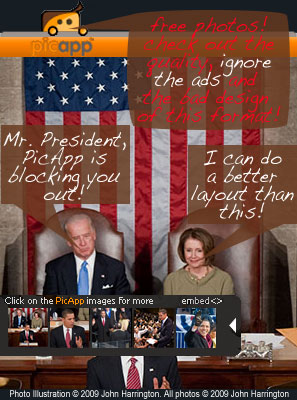No, You're Not Entitled To Anything
As my mother used to say, there are no guarantees in life, except death and taxes .A subset of those non-guarantees, is "nobody owes you anything, and you're not entitled to anything either."
Generally speaking, I think the last generation that thought they had to actually earn something is generation X. Generation Y, The millennials, and the youth of today, believe that everybody should get a ribbon, there are no winners and no losers, and you're owed a job once you graduate.
There are a few universal truths, so let's enumerate a few:
1) There will always be winners and losers. Period
2) Graduation from school prooves one thing - you can finish something you started. Beyond that, you'll have to demonstrate hard work, commitment, and a willingness to pay your dues.
I don't care if you're God's gift to landscape artistry, sports, fashion, or news photography, or somehow have a perspective no one has ever seen before. You still must pay your dues. You still must do hard work.
If you somehow have a reflex that puts you next in line to take Nemo's place in the Matrix, and you apply that to your trigger finger and focus ring to minimize lag time to take the best ball-on-bat/puck-in-frame/etc images, you don't just get called up to the majors right away. You have to prove you can do all of the other things related to it, like writing a solid caption, knowing the game and all the players, and being able to transmit on deadlines that are often unreasonable. That means starting in the bush league, youth sports, and so on.
If you have a nose for news, and somehow put yourself where the news is about to happen (no arsonists need apply) you might get some attention if you always have the flames licking up the side of a building when the rest of the photo dogs turn up and capture just the smouldering embers. If you can listen to a police scanner and know what's happening in real time, and not have any other assignments to get to before the perp walk, you might make a few good images. That said, even if the paper publishes your work from these spot news "gets", they don't owe you a staff job, or anything other than fair compensation for your images. They have no idea how you'd work on other assignments, or if you can be the generalist they need in addition to being Johnny-on-the-spot.
Fashion is it's own world, and to quote Heidi Klum, "you're either in, or you're out." Fashion is a fickle bird, and not even the best designers survive year to year. One year your work is all over Saks Fifth Avenue, the next, it's crowding the floors at Off Saks. Same for fashion photography. Everyone thinks it's glamorous, and everyone wants to photograph the pretty girls. However, who's photographing the handsome men? There's about a 50/50 split in the population, but you don't see any "will do trade-for-print with male models" ads. All of the ads for products I saw when I just read the latest issue of a photo trade magazine showed women as models - faces painted sliver/gold/bright colors. Yes, I know that sells cars, tools, and (atleast for men) makes the world go 'round and has started more than one war. However, you should not only be able to demonstrate good female model photography, but also male model photography. More importantly, though, is your ability to actually handle a shoot where models are present and being paid. (Models getting paid for modeling, is, after all, their ultimate goal - then you can call yourself a professional model.) Managing the catering, wardrobe, lighting assistants, props, and so on (not to mention the on-set client) takes time and a completely different skill set than knowing how a model (male or female) looks their sexiest. Annie Liebovitz, interviewed recently for Time (here) said "if something goes wrong with a photo shoot, it's my fault. It's up to me, it's my responsibility...if I don't get a good picture, I don't blame my subject, I blame me." Don't look at fashion photographs and in a smart-alecy way suggest that somehow you could do it better. Yes, I know that the proof is in the photograph, but managing everything that it takes to get to the point of that photograph as a final result is almost always a bigger part than closing the shutter at the right time.
It was once wisely said "luck is what happens when preparation meets opportunity."
Even the Declaration of Independence did not say you were entitled to happiness. It said it would protect your "pursuit of happiness".
One of the challenges that face "The Greatest Generation" and the Baby-Boomers is their belief that they are (or were, as it now known in most cases) entitled to a lifelong job. It was (mistakenly) assumed that, for example, if you went to work for IBM or the big bank on the corner, that you had a job for life. You'd work for a few decades, your commitment to them was reciprocated by their commitment to you, and you'd not get fired or laid off, save for gross incompetence. Today though, those companies are laying off the aging (and expensive) knowledgebase for cheaper workers. The problem is, those cheaper workers are coming with the baggage of an expectation of entitlement. They expect to be coddled and fawned over during their annual review, and told how great they are even when they're not.
Just because you read your the manual of your camera and know all its features and have all sorts of custom functions preset, or can follow-focus in manual down the playing field or up the catwalk, or even can light a subject like Rembrant, you're not entitled to have your images grace the covers of the world's greatest magazines. Heck, you're not even owed a drop of ink on the inside pages, or even guaranteed traffic to your online postings of said photos. Hey, you might get some "atta-boys" from the rest of the entitlement crowd that you convince to visit your corner of the internet, but then you're expected to go and hand out the same "awesome photo!" accolades to those, like a moebius strip of kudos, never ending, and never getting anywhere.
There are three podiums at the Olympics for each contest, and only one winner. Second and third are the runners-up, incase the first place winner cheated. The rest of the competitors don't get ribbons, and the only people who say they did a good job are their friends, family, and those that get paid to pay those type of compliments, lest they lose their job. These competitors know they must go back, and try again and try harder if they want to succeed.
From year to year, almost nobody remembers who won which Oscar, let alone who the losers were. Heck, even the presenters, admonished to say "and the Oscar goes to..." but more often than not say "and the winner is..." (belying how they really know things are) can't remember who won from year to year. Each year, the actors and actresses vying for the Oscar slog it out hoping to win once again, knowing that it's hard work acting, and if they want to keep doing it in the fickleness of Hollywood they better work at it.
The landscape is littered with the roadkill of those who think they are entitled or owed success in their chosen field. The sooner those with that attitude change, and really buckle down and do the hard work necessary to achieve success, the sooner they will achieve that success.
Success, real success, long-term sustainable success, is achieved by hard work day in, and day out. Don't rest on your laurels, lest they become the laurels of someone else. Sports legend Pat Riley once said "When a milestone is conquered, the subtle erosion called entitlement begins its consuming grind. The team regards its greatness as a trait and a right. Half hearted effort becomes habit and saps a champion.” What have you done today on your own personal road to become a champion in your field?
Please post your comments by clicking the link below. If you've got questions, please pose them in our Photo Business Forum Flickr Group Discussion Threads.


